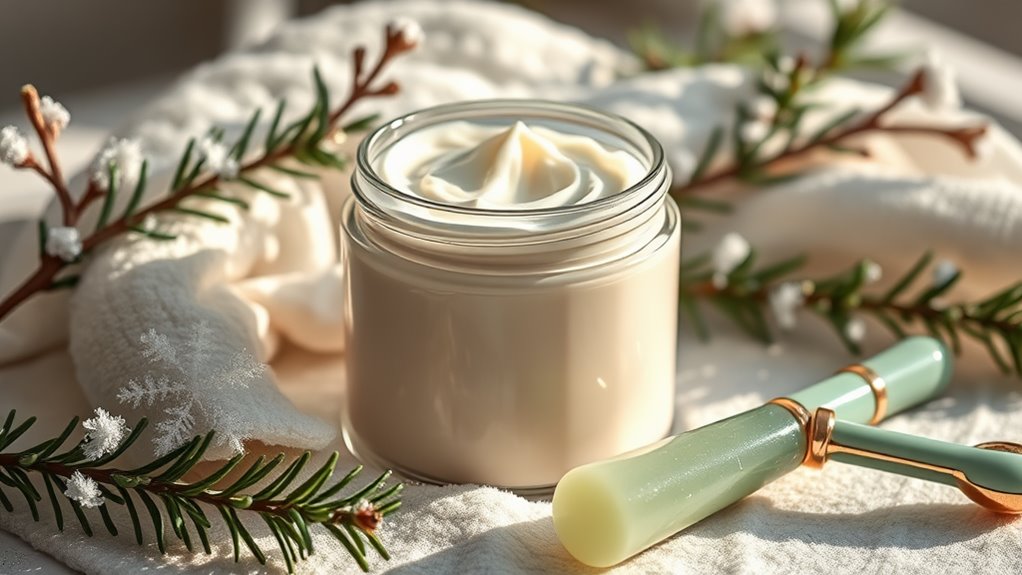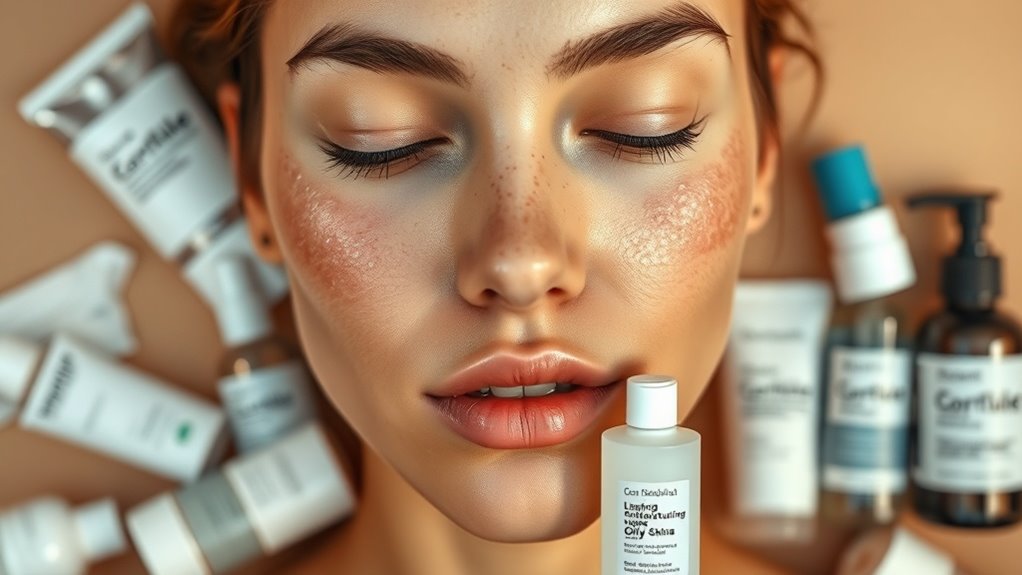Winter Skincare Secrets I Wish I Knew Earlier
Winter can wreak havoc on your skin, causing dryness and irritation if you’re unprepared. Hydration is key; drink plenty of water and choose thick moisturizers with hyaluronic acid and natural oils. Incorporate gentle face oils for added nourishment and always apply broad-spectrum sunscreen, even on cloudy days. Adjust your cleansing routine to milder products and limit harsh exfoliation. Understanding these changes can transform how your skin looks and feels, and there’s so much more to discover about winter skincare.
Understanding Winter Skin Changes
How does winter affect your skin? The cold air and low humidity can strip moisture away, leaving your skin dry and flaky.
To combat this, you need effective winter skincare tips.
Start by switching to a thicker moisturizer that locks in hydration. Incorporate ingredients like hyaluronic acid and glycerin, which attract moisture.
Don’t forget to exfoliate gently; this helps remove dead skin cells that can accumulate.
Also, consider using a humidifier indoors to keep the air moist. Using a humidifier can significantly improve skin hydration levels during the dry winter months.
Finally, protect your skin from harsh winds by wearing gloves and scarves. These simple adjustments can help maintain your skin’s health throughout winter.
Importance of Hydration
Hydration is your skin’s best friend during the winter months. As temperatures drop, your skin tends to lose moisture more rapidly, leading to dryness and irritation.
Drinking plenty of water is essential, as it helps maintain your skin’s elasticity and barrier function. Incorporate hydrating foods, like fruits and vegetables, into your diet for added benefits. Additionally, consider using a humidifier indoors to combat the dry air that winter brings.
Remember, well-hydrated skin looks plump and radiant, while dehydration can exacerbate issues like flakiness and redness. Unlocking radiant skin through proper hydration is key to enhancing your skin health.
Prioritize hydration to keep your skin healthy throughout the colder season.
Choosing the Right Moisturizer
When choosing a moisturizer for winter, you need to pay attention to the ingredients that nourish and protect your skin.
Look for products containing hyaluronic acid, glycerin, and natural oils, as these can provide essential hydration.
Additionally, the consistency of the moisturizer matters; a thicker cream may be more effective in locking in moisture during colder months. To ensure optimal hydration, be sure to use a product that includes essential winter skincare ingredients, which can help maintain your skin’s barrier against the cold.
Ingredients to Look For
What should you consider when choosing the right moisturizer for winter skincare? Look for ingredients that provide deep hydration and barrier protection. Here are key components to include in your search:
| Ingredient | Benefit |
|---|---|
| Hyaluronic Acid | Attracts moisture to the skin |
| Glycerin | Draws water and softens skin |
| Ceramides | Strengthens skin barrier |
| Shea Butter | Nourishes and soothes dryness |
These ingredients can help combat winter dryness and keep your skin looking healthy. Always check labels and choose a product that suits your skin type for the best results.
Consistency Matters Most
Choosing the right moisturizer is crucial, especially during the harsh winter months.
Look for a product that’s rich and hydrating, containing ingredients like hyaluronic acid, glycerin, and ceramides.
These elements lock in moisture and create a barrier against cold air.
You’ll want to apply your moisturizer consistently, ideally twice daily, to maintain your skin’s hydration levels.
Don’t forget to layer it over a serum for added benefits.
Pay attention to your skin type—whether it’s oily, dry, or sensitive—as this will guide your choice.
Consistency in your moisturizing routine can transform your skin, keeping it supple and protected all winter long.
Incorporating Face Oils
Have you ever wondered how to elevate your winter skincare routine? Incorporating face oils can make a significant difference. They lock in moisture and create a protective barrier against harsh elements. Choose oils like jojoba for hydration, rosehip for regeneration, or argan for nourishment. Using oil can actually benefit oily skin by balancing moisture levels, preventing breakouts, and enhancing overall skin health naturally.
| Oil Type | Benefits | Best For |
|---|---|---|
| Jojoba | Hydrating, non-greasy | All skin types |
| Rosehip | Regenerative, brightening | Mature skin |
| Argan | Nourishing, soothing | Dry, flaky skin |
Apply a few drops after your moisturizer to maximize hydration and achieve that coveted winter glow.
UV Protection in Winter
How often do you think about UV protection during the winter months? You might assume that because it’s cold and cloudy, UV rays aren’t a concern, but that’s a misconception.
Up to 80% of UV rays can penetrate clouds, and reflective surfaces like snow can amplify exposure.
To protect your skin, apply a broad-spectrum sunscreen with at least SPF 30 daily, even on overcast days.
Don’t forget areas like your ears and neck, which are often neglected.
Reapply every two hours when outdoors, especially if you’re skiing or participating in winter sports.
Consistent UV protection is vital year-round for healthy skin. Additionally, even in winter, dry skin can be exacerbated by UV exposure, making sunscreen essential.
Adjusting Your Cleansing Routine
When it comes to winter skincare, are you adjusting your cleansing routine to match the season’s demands?
In colder months, your skin tends to be drier and more sensitive, so it’s crucial to switch to a milder, hydrating cleanser.
Look for sulfate-free formulas that won’t strip essential oils.
You should also consider reducing the frequency of washing your face; twice a day might be too much for winter.
Instead, try cleansing once in the morning and once at night.
Additionally, incorporating natural remedies can further enhance your skin’s hydration and overall health during the dry winter months.
Exfoliation Tips for Winter
Exfoliating your skin in winter is essential to combat dryness and flakiness.
Start by choosing a gentle exfoliant, ideally one that contains natural ingredients like sugar or oatmeal.
Limit exfoliation to once or twice a week to avoid over-drying your skin.
When applying, use circular motions to help slough off dead skin cells without irritating your skin.
Always follow up with a rich moisturizer to lock in hydration.
Consider incorporating a hydrating mask post-exfoliation for an extra boost.
Lastly, remember to listen to your skin; if it feels sensitive, adjust your routine accordingly to maintain balance.
In addition, incorporating lifestyle changes such as staying hydrated and using a humidifier can further improve your skin’s texture during winter.
Nourishing Your Skin From Within
While keeping your skin smooth and fresh through exfoliation is important, nourishing your skin from within plays a vital role in maintaining its health during the winter months. A balanced diet rich in vitamins, minerals, and healthy fats can enhance your skin’s hydration and resilience. Additionally, hydration plays a key role in achieving a refreshed appearance during this season. Consider incorporating these essential nutrients into your meals:
| Nutrient | Sources | Benefits |
|---|---|---|
| Omega-3 Fatty Acids | Salmon, walnuts, flaxseeds | Reduces inflammation, boosts hydration |
| Vitamin E | Almonds, spinach | Protects skin from oxidative stress |
| Vitamin C | Citrus fruits, bell peppers | Promotes collagen production |
| Zinc | Pumpkin seeds, chickpeas | Aids in skin repair and healing |
| Biotin | Eggs, avocados | Supports skin elasticity |





